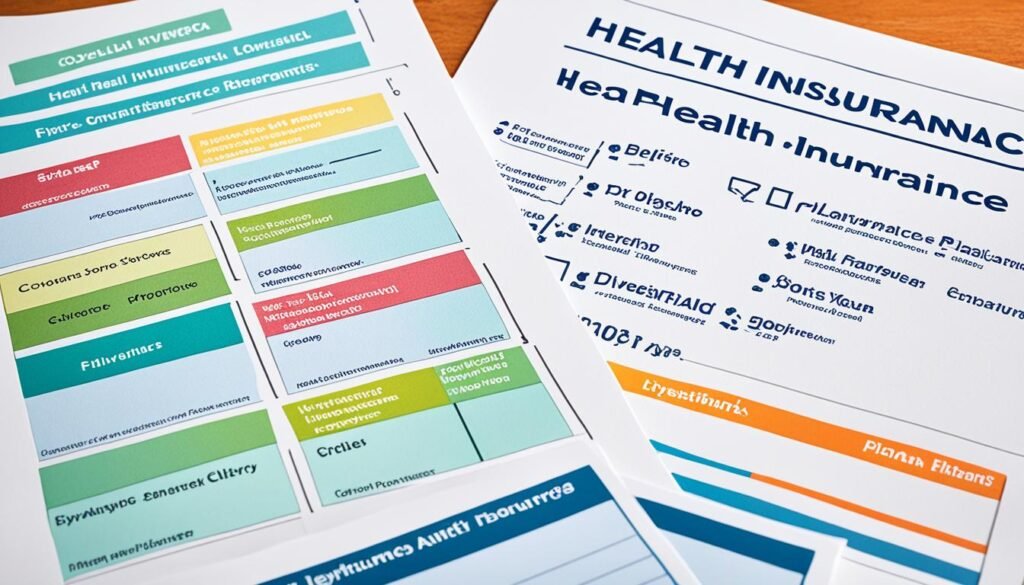Types Of Insurance: Insurance safeguards your assets and financial health from unexpected events. It includes auto, home, renters, life, health, and special insurance. Each kind of insurance serves unique needs, offering specific coverage.
It’s vital to know about these types and their advantages. This knowledge helps in choosing what’s best for your situation.
Key Takeaways
- Insurance policies safeguard against various risks like auto accidents and health crises.
- Choosing the correct insurance is vital for protecting your financial future and assets.
- Types such as auto, home, renters, life, and health insurance offer specific protections.
- Specialty insurance covers unusual risks, including boat/marine and pet insurance.
- Assessing your insurance needs and knowing your options are crucial for good choices.
Introduction
In today’s world, the importance of insurance is crucial. It protects us from unforeseen events like car crashes, natural disasters, or health emergencies. These incidents can deeply impact us both emotionally and financially. Insurance acts like a strong safety net, offering financial protection and risk mitigation.
Insurance means we’re not alone; it helps us combat financial burdens from covered accidents. It moves the risk to the insurance company, giving us peace of mind. With our belongings and finances covered, we can fully focus on healing. This way, we worry less about costs and more about getting our lives together again.
The importance of insurance reaches further than individual safety. It also bolsters the economy by providing safety for businesses and communities. With insurance, people and groups can bounce back from unexpected knocks. This contributes to a strong and prosperous economy for everyone.
“Insurance is not just a necessary evil; it’s a financial tool that can provide invaluable peace of mind and protection in times of need.”
Learning about the different types of insurance and their benefits is crucial. It helps you make smart choices to protect your future. Whether it’s safeguarding your house, car, or life, insurance is key to avoiding financial disaster after a surprise hit.
Next, we’ll delve into various insurance types and their risk-mitigating roles in your daily life. Choosing the right insurance means you and your family are ready for surprises. This lays a strong base for your financial safety and general well-being.
Also Read : How To Boost Your Credit Score For Better Loan Options
Auto Insurance

Auto insurance is key for protecting your car and yourself. It covers various situations, keeping you safe on the road.
Liability Coverage
This part of auto insurance helps you if you cause an accident. It takes care of the other person’s injury costs and damages. It’s required in most states to have enough liability coverage.
Uninsured/Underinsured Motorist Coverage
If another driver is at fault and doesn’t have enough insurance, you’re still protected. This part of your insurance helps with your medical costs and damage. It’s important because not all drivers have proper insurance.
Personal Injury Protection
PIP or no-fault insurance covers your medical bills and lost wages. It helps no matter who is to blame in the accident. This coverage is valuable for protecting your finances.
When you look for auto insurance, knowing the types of coverage is crucial. With the right liability, uninsured/underinsured motorist, and personal injury protection, you and your car will be safe.
Also Read :What Is Professional Liability Insurance?
Home Insurance

Home insurance is like a bodyguard for your home, keeping it safe. Although it’s not needed by the law in most places, getting home insurance is smart. It protects your home and what’s inside from dangers. Most home insurance will cover your house and assets from different types of harm.
Dwelling Coverage
Dwelling coverage protects the structure of your house. It includes the walls, floors, and even the appliances. If something like a fire, storm, or vandalism happens, it helps fix or rebuild your home.
Personal Property Coverage
This part covers things like your furniture, electronics, and clothes. If these items are stolen or harmed in a covered event, this insurance helps replace them.
Liability Coverage
Liability coverage is important because it can save you from big legal bills. It helps if someone gets hurt on your property. Or if you damage someone else’s property, it can help with legal costs and any payments.
Knowing about these coverages lets you choose carefully. Whether you just bought your own place or are updating your insurance, picking the right one brings calm and security.
| Coverage Type | What It Covers | Importance |
|---|---|---|
| Dwelling Coverage | Protects the physical structure of your home | Helps repair or rebuild your home in the event of damage |
| Personal Property Coverage | Protects the belongings inside your home | Helps replace stolen or damaged items |
| Liability Coverage | Protects you from legal liability for injuries or property damage | Covers legal fees and settlements if you are found responsible |
Renters Insurance

If you rent a place, renters insurance is key for protection. It covers your stuff like furniture and clothes if they get stolen or damaged. Renters insurance also helps if you hurt someone or their property, covering your costs. And if your place is unlivable due to a problem, it can pay for you to stay somewhere else.
Renters insurance keeps your back even if you don’t own your place. It saves you from big costs by covering your things and if accidents happen. Having it means you can relax, knowing your stuff and money are safe.
- Renters insurance covers your personal belongings, including furniture, electronics, and clothing, if they are stolen or damaged.
- It provides liability coverage if you accidentally cause injury or property damage to others.
- Renters insurance can pay for additional living expenses if your rental becomes uninhabitable due to a covered incident.
While not a must like for homeowners, renters insurance is a great choice. It’s budget-friendly and secures your finances in surprises. With this, you make sure both you and your things are protected, no matter if you rent or own your home.
“Renters insurance is an essential safeguard for anyone who doesn’t own their own home. It’s an affordable way to protect your personal belongings and provide liability coverage in case of accidents or emergencies.”
Also Read :Top Tips For Getting Your Loan Approved
Umbrella Insurance

In today’s world, it’s wise to guard your assets against lawsuits. Your usual insurance, like auto or renters, might not protect you fully. That’s why you need umbrella insurance. It adds more liability coverage to your protection.
Umbrella insurance comes into play when your other policies max out. It helps pay for damages if you’re held responsible but coverage falls short. It covers extra costs like medical bills, legal fees, and big settlements. This extra layer is key, especially if you own a lot that could be taken in a lawsuit.
Safeguarding Your Wealth
For those with big assets or income, umbrella coverage is essential. Here’s why it matters:
- You face a major car crash lawsuit that goes over your auto insurance.
- Someone gets hurt at your place and sues for more than your home insurance covers.
- Your pet injures a neighbor badly, costing more than your renters insurance allows.
In these cases, an umbrella insurance policy comes to the rescue. It prevents your personal assets from paying off big liabilities.
Asset protection with umbrella insurance is smart for the wealthy or those more likely to be sued. It offers extra peace of mind. With more liability coverage, your financial future is safer from surprises.
Also Read :Best PHD Scholarships In USA For International students
Life Insurance

Life insurance is crucial for our financial plans. It offers protection for you and your loved ones if you pass away. There are mainly two kinds of life insurance: term and permanent. Knowing the difference helps choose the best one for your needs and what you can spend.
Term Life Insurance
Term life insurance covers you for a set time, usually 1 to 30 years. It’s the cheaper option since it just pays if you die during the set time. It works well for those who need insurance for things like paying off a mortgage or until their kids are grown.
Permanent Life Insurance
Permanent life insurance lasts your whole life and can grow in value. It’s made up of whole life and universal life insurance. Although it costs more than term life, it offers protection for life as long as you keep up with the payments.
Choosing between term life insurance and permanent life insurance depends on your goals, how long you need coverage, and what you can afford. Both are important for securing your family’s future. But, the best choice is the one that fits your personal situation and financial needs.
| Feature | Term Life Insurance | Permanent Life Insurance |
|---|---|---|
| Coverage Duration | Specific term (e.g., 10, 20, 30 years) | Lifelong |
| Cost | Generally lower premiums | Generally higher premiums |
| Cash Value Accumulation | No cash value | Builds cash value over time |
| Payout | Only pays out if the policyholder dies during the term | Pays out regardless of when the policyholder dies |
The decision between term life insurance and permanent life insurance is based on what you need and can afford. Knowing the details about each type helps you make a smart choice. This way, you can ensure your family is both protected and the costs fit your budget.
Health Insurance

Health insurance is key for financial security. It shields individuals and families from huge medical bills. These unexpected costs can cause a lot of stress. In the U.S., you can get health insurance through work, the marketplace, or insurance companies directly.
Types of Insurance Plans
There are many health insurance types to choose from. Knowing what each plan offers can help you make the right choice. This is based on your healthcare needs and what you can afford.
- Employer-sponsored health insurance – Many employers have health plans for their workers. These group plans can be cheaper and offer good coverage.
- Individual/family health insurance – You can buy health insurance on your own. Look for plans either directly from companies or through the Affordable Care Act’s marketplace.
- High-deductible health plans (HDHPs) – HDHPs cost less each month but you pay more out-of-pocket before it covers you. They usually come with a health savings account to help with these costs.
- Medicare and Medicaid – For those who qualify, the government has Medicare and Medicaid. They help cover health costs for people with certain needs, including those with low incomes.
Choosing a health plan means looking at the costs and what it covers. By knowing your options, you can pick a plan that suits your finances and health needs best.
“Health insurance is not just a piece of paper. It’s peace of mind, financial security, and access to quality healthcare when you need it most.”
Business Insurance

Businesses have their own set of unique risks. This is where business insurance coverage steps in. Such policies protect your company. They do this by covering liabilities from accidents on your property, theft, and other hazards.
Key types include:
- General Liability Insurance: This covers your business against claims of injuries, property, and ads harm caused by you.
- Property Insurance: It protects your business’s physical assets, like buildings, equipment, and supplies, from damage or theft.
- Workers’ Compensation Insurance: Offers support for medical bills and lost wages if an employee gets hurt at work.
- Professional Liability Insurance: Known as errors and omissions (E&O), it guards your business against negligence claims in your services.
Depending on your business, you might need more. For example, cyber or product liability insurance. Or even insurance for employment practices. These tailored options protect you from business-specific risks.
Having solid business insurance is essential. It keeps your finances stable and your assets safe. With the right knowledge, you can craft a plan that meets your needs for liability coverage and property coverage.
| Type of Business Insurance | Coverage Provided |
|---|---|
| General Liability | Protects against claims of bodily injury, property damage, and advertising injuries caused by your products, services, or operations. |
| Property Insurance | Covers the physical assets of your business, such as your building, equipment, and inventory, in the event of damage or theft. |
| Workers’ Compensation | Provides coverage for medical expenses and lost wages if an employee is injured on the job. |
| Professional Liability | Protects your business from claims of negligence or mistakes in the services you provide. |
Understanding all options in business insurance helps you build a strong risk management plan. This strategy allows you to focus on business growth with confidence.
Specialty Insurance

Most people have basic insurance for their car, home, or life. But what about your boat or pet? There’s special insurance for these and more. These policies meet unique needs not covered by standard plans.
Boat/Marine Insurance
Boat/marine insurance is vital for those with watercraft. It covers the boat’s parts, machinery, and liability. Fishing enthusiast, leisure boater, or commercial boat operator, boat/marine insurance protects your water-time investment.
Pet Insurance
More and more, pet lovers see pet insurance as crucial. It offsets vet bills, including emergency treatments and checkups. With pet insurance, owners ensure top healthcare for their animals sans financial worry.
There’s a broad range of specialty insurance out there. Whether safeguarding your boat, pet, or something extraordinary, tailor-made policies offer the reassurance you seek.
Also Read : Can I Get An Upgrade Loan For Home Improvements?
Conclusion
Insurance is key to managing risks well. It protects your stuff, your family, and your money. There are many kinds of insurance, from auto to life to health. You can choose what you need to cover the risks you have.
If you want to protect your things or your loved ones, the insurance industry has many options. It’s important to know what each type does. This way, you can pick the ones that help you most.
When looking at insurance overview and different insurance types, think about what you really need. Consider your risks and the coverage that fits you best. With the right plans, you can feel more secure. Your assets, family, and money will be better protected from life’s surprises.
FAQs
What are the different types of insurance?
Insurance comes in many forms, covering different risks. Types include auto, home, renters, life, and health.
Why is insurance important?
Insurance keeps your finances safe from sudden blows. It’s your backup, whether it’s a car crash, a fire at home, or a health crisis.
What does auto insurance cover?
Auto insurance safeguards you and your car. It includes liability, coverage for when the other driver is not insured enough, and personal injury.
What does home insurance cover?
Home insurance shields your house, belongings, and you in case someone gets hurt on your property.
What does renters insurance cover?
Renters insurance protects your stuff and helps with extra living costs if your place is ruined by a covered event.
What is umbrella insurance?
Umbrella insurance offers extra protection where your other insurances stop. It shields you from losing your assets to a big lawsuit.
What are the different types of life insurance?
Life insurance usually has two main types: term life and permanent life. They both have different perks and coverages.
What does health insurance cover?
Health insurance can come from work, the government marketplace, or private companies. It pays for doctor visits and treatments.
What types of insurance do businesses need?
Businesses often need general liability, property, workers’ comp, and professional liability. These cover various business risks.
What is specialty insurance?
Specialty insurance is for unique things like boats or pets. It offers focused protection for uncommon needs.
Source Links
- https://www.healthcare.gov/choose-a-plan/plan-types/
- https://www.forbes.com/advisor/insurance/types-of-insurance-policies/
- https://www.insurance.wa.gov/types-insurance




